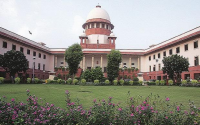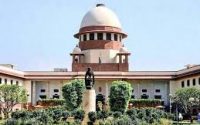Deadline for Ayodhya hearing: What if case is not decided before CJI retires?
Source: indiatoday.in
he Supreme Court has set a tentative deadline for completion of arguments in Ayodhya title dispute by October 18. If this happens, this would give the bench roughly a month’s time to pronounce its judgment.
For, if the Supreme Court bench does not decide the case before Chief Justice Ranjan Gogoi retires on November 17, the matter would be back to square one.
As per convention, a Supreme Court bench that hears a case also delivers verdict in the same case. If a judge retires before the case is adjudicated, a new bench is constituted and the matter is heard afresh.
“Since the CJI is going to retire on November 17, finalising a deadline is correct. This would give him and the bench necessary time to apply their minds to examine the arguments advanced by the parties and write the judgment,” Supreme Court lawyer Atul Kumar told Indiatoday.in.
Kumar outlined practicality of the deadline set by the CJI-headed five-judge constitution bench. “Besides this Ayodhya title suit, judgments in some other constitutional matters – such as new land acquisition law – are also reserved. The CJI needs time to apply his mind before delivering the judgments in all these cases and he has got only as much time,” he said adding, “Writing of judgment in Ayodhya case will take substantial time keeping in view the extensive arguments advanced by the parties.”
The Supreme Court began day-to-day hearing in the Ayodhya case on August 6 this year even though the matter had reached here in 2011, when multiple petitions were filed challenging the Allahabad High Court judgment of 2010.
The high court had ordered to partition of the 2.77 acre land at the disputed site of Ram Janmabhoomi-Babri Masjid into three equal parts among Ram Lalla – the presiding deity, the Nirmohi Akhara – representing the Hindus and the Sunni Waqf Board – representing the Muslim side.
There have been allegations by the BJP and Hindu outfits that the Ayodhya case hearing was deliberately delayed at various stages. They allege that the case was not touched by the Supreme Court for six years till 2017 as the previous Congress-led UPA government was not interested in settling the Ayodhya dispute.
The matter gained momentum in 2017 when a three-judge bench of the Supreme Court led by then CJI Dipak Misra began hearing on a petition seeking review of a 1994 Allahabad High Court judgment pronouncing that a mosque was not an essential part of Islam. This case had a direct bearing on the Ayodhya dispute as the existence of Babri Mosque was referred to as a matter of freedom of religion.
During the course of this case in 2017, Kapil Sibal, senior advocate and the Congress lawyer appeared for the Muslim side and requested the Supreme Court to defer the matter till the completion of the 2019 Lok Sabha election. This caused a huge political row. The Supreme Court, however, rejected Kapil Sibal’s request.
The judgment in the case was delivered on September 27 last year. CJI Misra retired on October 2. The Supreme Court also ruled that the Ayodhya title suit would be heard by a new bench of three judges from October 29, 2018.
Another break came in the court-adjudication in Ayodhya case when in March this year, the Supreme Court formed a mediation panel headed by former Supreme Court judge FM Ibrahim Khalifullah with Sri Sri Ravi Shankar of the Art of Living Foundation and senior lawyer-mediator Sriram Panchu as members.
The panel was given time till August 15 to submit their report. However, a report in early August indicated a failure of the mediation efforts. This led to day-to-day hearing of the Ayodhya case from August 6.
Since then, the arguments by the petitioners have been lengthy in Ayodhya case prompting the bench to go for a time-frame so that a verdict is possible for the bench is rendered infructuous with the retirement of CJI Gogoi.
“In the English common law and the US Supreme Court, generally time is allocated to the parties, who have to finish their arguments within that time frame. This helps speedy delivery of justice,” Kumar said.
“In the worst case, if the retiring judge does not manage to deliver the judgment before retirement, the arguments have to be advanced afresh before a new constitution bench. It would be nothing but wastage of the resources,” Kumar said.
The Supreme Court is heading to a holiday season on account of major festivals such as Dussehra and Diwali. The court will be closed for 15 days on account of festivals and other holidays besides Saturdays and Sundays before CJI Gogoi retires. Ayodhya case could be a legacy judgment of CJI Gogoi if bench manages to hear the arguments and deliver verdict in time.



